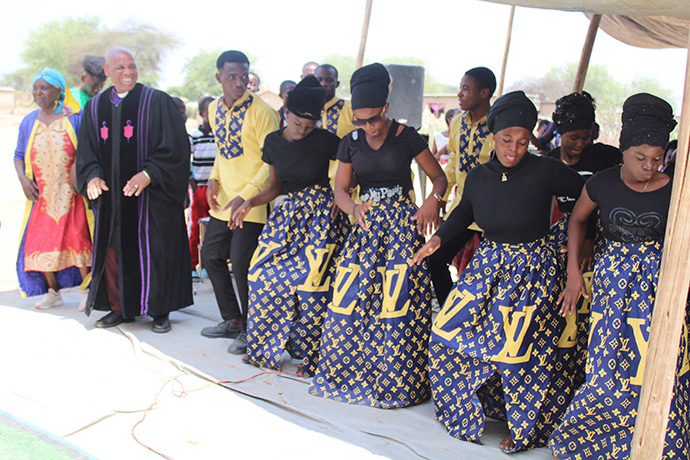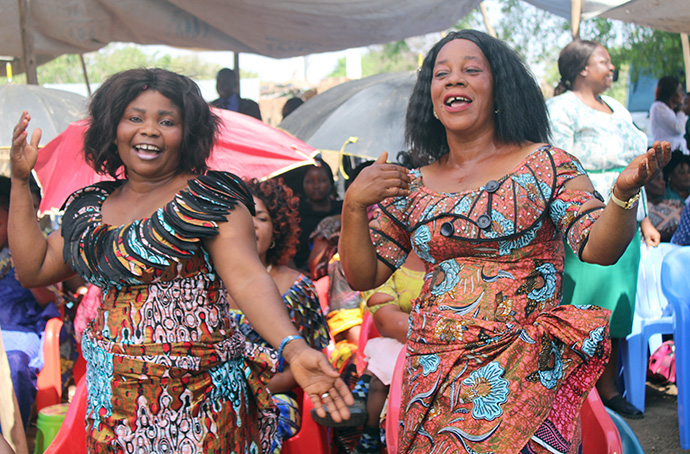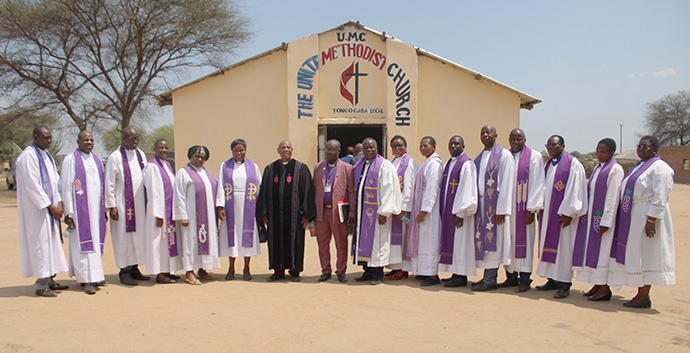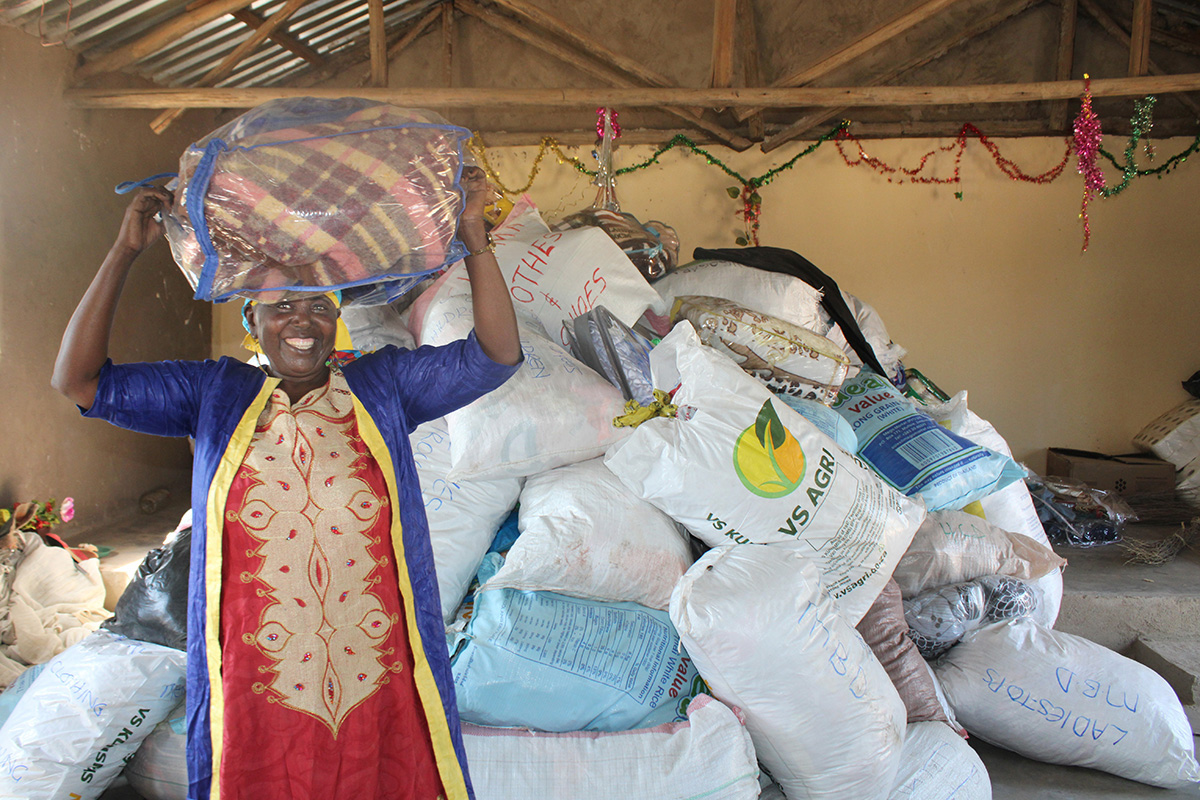Key Points:
- Refugees and asylum-seekers of different cultures, ethnicities and languages have established a preaching point and built a new sanctuary at Tongogara Refugee Camp in Zimbabwe.
- Bishop Eben K. Nhiwatiwa and his cabinet made their first visit to the camp and praised the “evangelism in action.”
- Before constructing the sanctuary, the church members worshipped in a member’s house and later a makeshift structure of wooden poles, plastic and canvas.
Beyond the dusty gravel roads, bright smiles, ululations and drumbeats welcomed the winding convoy of Bishop Eben K. Nhiwatiwa and his cabinet. The occasion was their first visit to a community of United Methodists at Tongogara Refugee Camp.
The camp is home to refugees and asylum-seekers who fled the war-torn Great Lakes region, predominantly Congo and Mozambique.

Driven by passion to seek God within their new home, the camp residents found one another, congregated and established a United Methodist preaching point.
“God works in mysterious ways,” said Nhiwatiwa, who leads the Zimbabwe Episcopal Area.
“No one could ever imagine that United Methodists of different cultures, ethnicities and languages (would) assemble to form a congregation.”
Before constructing the sanctuary, the diverse United Methodist family began worshipping in a house, then in a makeshift structure of wooden poles, plastic and canvas.
Kelly Kasukulukatanga from Congo is the lay leader of the Tongogara Preaching Point. “We started this preaching point in 2009 in one of our member’s houses,” he said. “Today we have constructed a sanctuary.”
The increasing numbers of seekers, believers and community members continue to surprise the leaders. “The members have since increased numerically to 185; the sanctuary is now small, and we wish to expand it,” he said.
“We want to buy a church vehicle in 10 years’ time by contributing a dollar per person every month. We need to be connected to other members of the UMC in Zimbabwe. The youth need to participate in talent shows. We need more donations (to meet) basic human needs like food, clothes and scholarships for our children.
“We are happy that our wish to connect with the bishop and the whole episcopal area has been fulfilled,” Kasukulukatanga added.

The bishop’s first encounter with members of the Tongogara Refugee Camp Preaching Point was at Chipangayi Local Church, where he was dedicating a sanctuary. They were one of the guest choirs.
“When they sang,” Nhiwatiwa said, “I could not understand their language. I was inquisitive to know them more, hence this visit,” he said.
“Today was a beautiful day of worship. We are going to establish a perpetual relationship with them. They are loving people.
“With my leaders here, we are going to follow a transformative journey where we will address the issue of incorporating them into our church system. They have established a church, which is a center of … everlasting fellowship.
“What has happened here is evangelism in action,” Nhiwatiwa continued. “No one planned this, but God. We were called to respond to God’s evangelism. God is the owner of evangelism.”

The congregation is outgrowing the sanctuary as they respond to the call of mission. Quoting Christ’s call in Matthew 28:18 to make disciples, he said, “This is exactly what is here.”
Rehoboth Mission Church Resident Bishop Djuma Mutahonga Timothée spoke on behalf of Johane Mhlanga, Tongogara Refugee Camp administrator.
“This is the beginning of a good relationship which came when we are advancing on our transformative agenda on the welfare of the refugees and asylum-seekers,” Timothée said.
“Our wish is to turn Tongogara into a service center. The church is a critical player in this agenda. My dream is that one day I will commission a classroom block constructed by the UMC for God’s children to enjoy their right to education in Tongogara.”
Calling the bishop’s visit “memorable,” Timothée said, “He has left indelible marks in our hearts. (We) will forever cherish this day. Thank you for your love.”
Nhiwatiwa assured Timothée that education is part of The United Methodist Church’s DNA. “Africa University is not far away,” he said. “We can do the classroom block without any hassle.”
Shance Ibrahim, a refugee mother of two from Congo, said she has been in Zimbabwe for five years.
“I left my country because of conflicts. I have found Zimbabwe to be safe for me and my family.
Subscribe to our
e-newsletter
“However, the main challenge is food, education and health of children. We do not have a source of income to enable us to pay school fees for our children.”
Aline Wakanga, 19, said she came to Zimbabwe from Congo in 2015 with her mother.
“My father deserted us and did not want the responsibility of raising us. I was able to go to school, and today I earn my living through hair dressing. Because of the conflicts in my country, I feel much safer and at peace in Zimbabwe.
“In church, I am one of the choristers. We have a vibrant choir. I enjoy singing. We gave a dove (to signify peace) to Bishop Nhiwatiwa. We have peace here.”
Rosemary Wangechi Mwenja, from Kenya, came to the camp in 2014 to escape tribal persecution. Her husband and oldest child were killed. She does not know the fate of her other three children and one grandchild.
“I feel at peace here,” she said, “because there is no fighting spiritually or physically. People in Zimbabwe are generous. When I seek help, they respond positively. I enjoy going to church. I have been a lay leader, and now I am pastor-parish relations committee chair.”
Kaluta Zakaria-Nestory agrees. She said she enjoys her congregation, where she is associate lay leader. “I came to Zimbabwe in 2011 because of persecution taking place in (the Democratic Republic of Congo). There was a lot of insecurity. I now have seven children, and I feel safe.”
She said the biggest challenge is the lack of basic needs.
“There is no employment, no space to farm or to do gardening. We just depend on donations, which is un-African. We want to work for our families.”
Makala Bwami Daniel, church treasurer, came from Congo in 2019 with his seven children. “I use my motorbike to transport people for a token of appreciation so that I can earn a living,” he said. “We are very happy with the coming of the bishop.”
The Rev. Sophirina Sign, Zimbabwe East Conference connectional ministries director, expressed joy at the program’s success. “The process was long but worth it,” Sign said. “We supported our church members with clothes, food items, utensils, blankets and toiletries, all valued at $20,000. Deeds of donations were signed by the bishops for onward submission to camp authorities.”
The Rev. Douglas Maundukuse, pastor-in-charge, said the support is a dream come true.
“We have been spiritually uplifted. We worshipped, prayed, interacted and danced. We thank the bishop for this event of the year.”
Chingwe and Maforo are United Methodist communicators in Zimbabwe.
News media contact: Julie Dwyer at (615) 742-5470 or newsdesk@umnews.org. To read more United Methodist news, subscribe to the free Daily or Weekly Digests.




